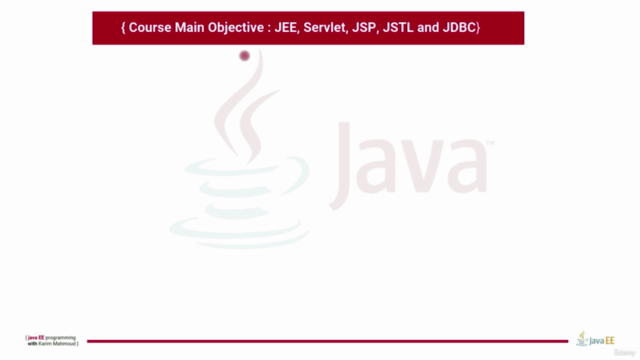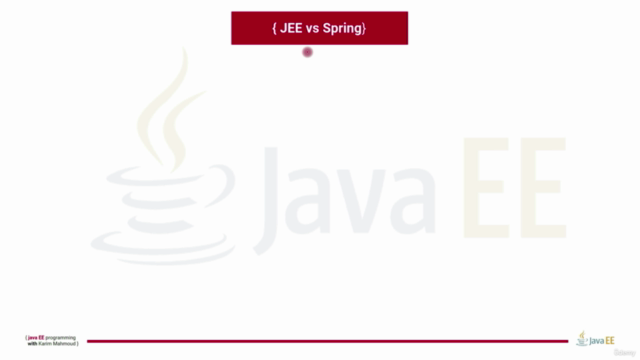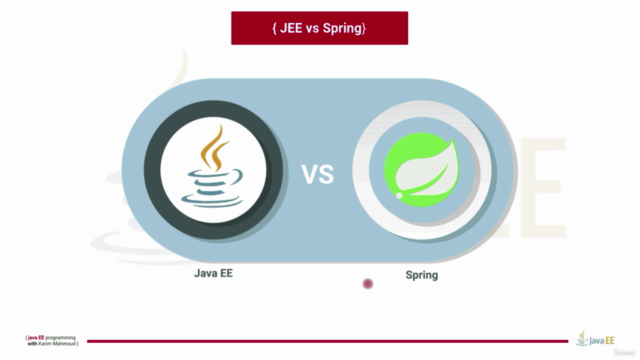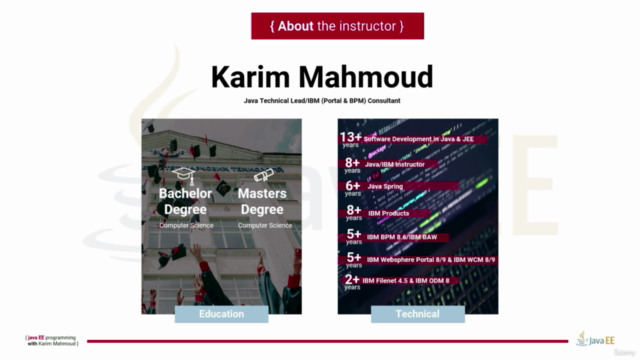Java Web Development / JEE / Jakarta EE (Servlet, JSP, MVC)

Why take this course?
🚀 Master Java Web Development with JEE, Servlets, JSP, MVC & More! 🌟
JEE Architecture and Technologies Overview
Welcome to our comprehensive course on Java Web Development / JEE / Jakarta EE! This course is a deep dive into the core technologies that power enterprise applications. We'll cover the essentials of Servlet 2/3, JSP 2, JSTL, MVC Pattern, Maven, JDBC, MySQL, and more, including front-end technologies like HTML, CSS, JavaScript with frameworks such as Bootstrap, JS (including JQuery, Angular JS), and a head-to-head comparison of Spring vs JEE.
Course Curriculum Breakdown:
Part 1: Introduction to Web Development
- JEE Architecture
- History and Technologies
- Understanding Web Applications, Components, and Containers
- Static vs Dynamic Web Applications
- Application Development and Deployment Steps
- Creating and Configuring Web Application Archives (WAR files)
- Understanding HTTP URLs
Part 2: Servlet Programming
- Agenda and Overview
- Servlet in the Context of J2EE
- Request & Response models
- Servlet Life Cycle
- Scope Objects, ServletContext, and Session Management
- HttpServletRequest and HttpServletResponse
- Error Handling
- Including and forwarding Requests, Redirecting, Servlet Filters, and Listeners
- Session Tracking and Servlet 3.0 Enhancements
Part 3: JSP Programming
- What is JSP and its Elements
- Understanding Static vs Scripting Elements
- JSP Actions, Standard Actions, and JSTL Actions
Part 4: Build a JEE CRUD Application
- Project Preparation (MySQL and Maven Setup)
- Application Architecture (MVC Design Pattern)
- Building the Employee-CRUD Application
- Bootstrapping with HTML, CSS, Bootstrap, JSP, JSTL, MySQL, Angular JS, Maven, Servlet, JDBC
- Model Layer Implementation
- Controller Layer Implementation
- View Layer Implementation
Part 5: Course Summary and What's Next
What You'll Learn:
- Servlets: The backbone of web applications, we'll cover everything from the basics to advanced topics including Servlet 3.0 features.
- JSP: Discover how to create dynamic and interactive web pages with JSP, including its elements and standard actions, and learn how to integrate with JavaScript and AJAX through JSTL.
- MVC Pattern: Understand the Model-View-Controller pattern that separates the input logic (Model), user interface (View), and controller (controller) into individual components.
- JavaServer Pages Standard Tag Library (JSTL): Learn how to use JSTL for processing HTML templates, XML documents, JavaBeans, and exposure of Java objects to the std.io Streams.
- Maven: Master the Maven build automation tool for project building, dependency control, and continuous integration.
- JDBC: Connect Java applications to databases and perform CRUD operations.
- MySQL: Set up a MySQL database and integrate it with your Java application.
- Front-End Technologies: Get hands-on experience with HTML, CSS, Bootstrap, JavaScript (including JQuery and Angular JS) for building responsive and interactive user interfaces.
- Spring vs JEE: Understand the differences between these two powerful frameworks and learn when to use each.
Why Take This Course?
This course is designed to provide you with a solid foundation in Java web development. You'll gain practical experience by building a real-world employee CRUD application from scratch. By the end of this course, you'll not only understand the theory behind Java web technologies but also have the skills to implement them effectively in your own projects.
Whether you're a beginner looking to break into web development or an experienced developer seeking to deepen your knowledge of Java and its ecosystem, this course will equip you with the tools and insights needed to excel in the field. 👨💻👩💻
Enroll Now & Start Your Journey to Mastering Java Web Development!
Dive into the exciting world of Java web technologies, and transform your coding skills with our comprehensive course on JEE, Servlets, JSP, MVC, and more. 💻✨
Course Gallery




Loading charts...